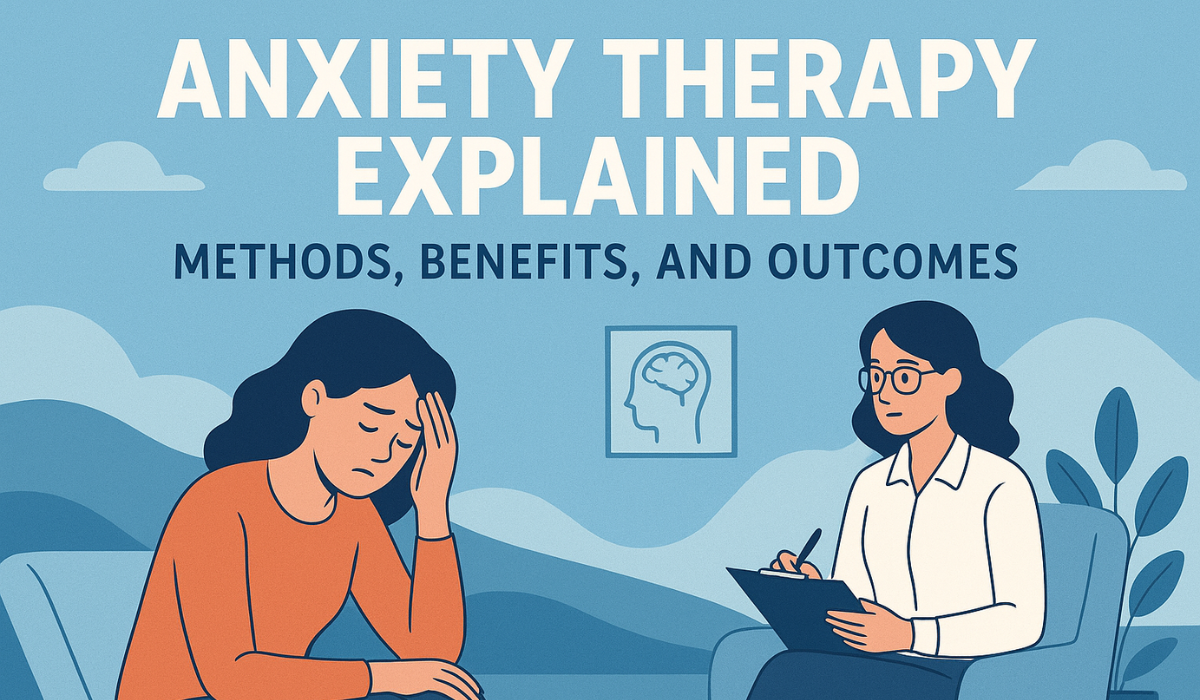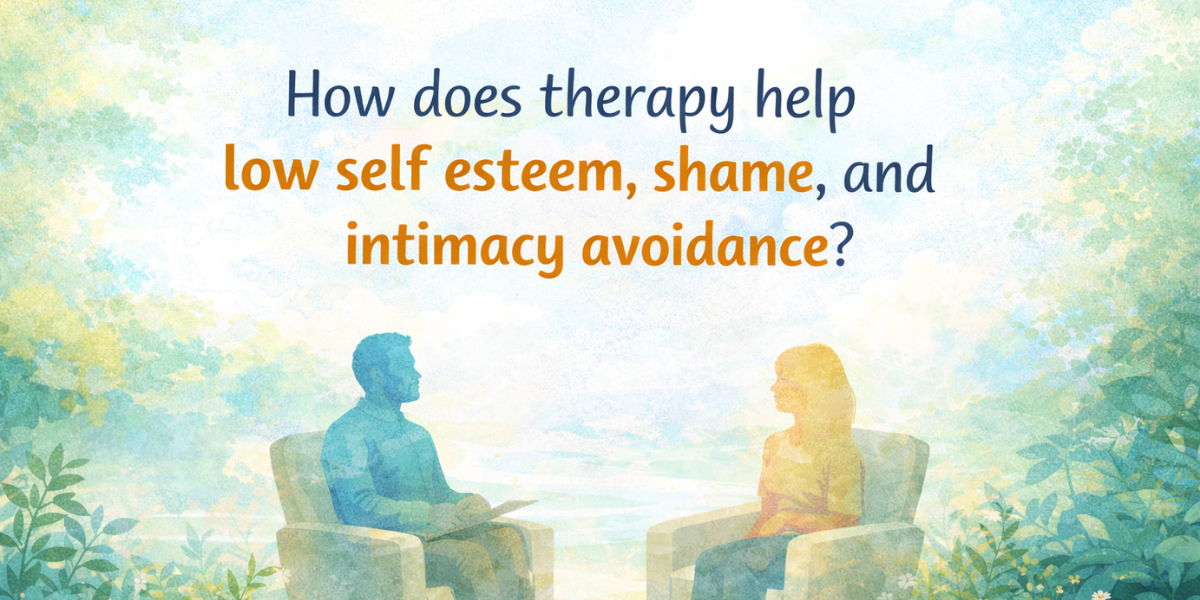Anxiety can feel like a constant buzz in the back of your mind. Some days, it’s a faint whisper. Other days, it’s loud enough to drown out everything else. That’s where anxiety therapy comes in. Therapy isn’t about “fixing” you—it’s about guiding you toward tools and strategies that make life easier, calmer, and more balanced.
As one therapist once said, “Anxiety is a messenger, not a monster.” Understanding it and working with it through therapy can open doors to healing.
What Is Anxiety Therapy?
At its heart, anxiety therapy is a structured process where you talk with a trained professional who helps you explore your feelings, thoughts, and reactions. It’s not just about talking, though. It’s about learning practical techniques to manage the racing thoughts, the sleepless nights, and the constant “what-ifs.”
People often think therapy is only for major crises. But the truth is, therapy can be helpful for anyone navigating overwhelming stress. For instance, therapy for anxiety during major life change—like moving to a new city, starting a new job, or going through a breakup—can be life-changing. These moments often bring uncertainty, and therapy helps provide a safe anchor.
Why People Seek Anxiety Therapy
You don’t need to wait until things feel unbearable to seek help. Many people start therapy when they notice:
- Restlessness that won’t go away.
- Racing thoughts before bed.
- Trouble concentrating on work or studies.
- Feeling overly worried about everyday situations.
- Physical symptoms like tightness in the chest or stomachaches.
“Therapy gives me a place where my worries don’t feel silly,” one client shared. That’s the beauty of anxiety therapy—it validates what you’re going through and shows you that you’re not alone.
Common Methods in Anxiety Therapy
There isn’t just one type of therapy for anxiety. Therapists use different approaches depending on your needs. Here are some of the most common methods:
1. Cognitive Behavioral Therapy (CBT)
CBT is one of the most well-known and effective treatments. It helps you identify negative thought patterns and replace them with more balanced ones. For example, if your thought is “I’m going to fail at this project,” CBT helps you question that belief and reframe it into something more realistic, like “I can prepare well and give my best effort.”
2. Exposure Therapy
This method helps you gradually face situations that trigger anxiety. It’s done gently and in steps. For example, if you fear social events, exposure therapy might start with visualizing a gathering, then practicing conversations, and eventually attending a small event. The goal is to build confidence little by little.
3. Mindfulness and Meditation-Based Therapy
These techniques focus on teaching you how to stay present. Anxiety often comes from worrying about the future or ruminating about the past. Learning to breathe, ground yourself, and pay attention to the “now” helps reduce that spiral.
As one mindfulness teacher puts it, “The present moment is the only safe place we truly have.”
4. Acceptance and Commitment Therapy (ACT)
ACT helps you accept your feelings instead of fighting them. It teaches you to create distance between yourself and your anxious thoughts, so they don’t control your actions.
5. Medication and Therapy Combined
For some, therapy works best alongside medication prescribed by a doctor. This isn’t a sign of weakness. It’s simply another tool in your toolkit. Think of it like wearing glasses—sometimes your brain just needs extra support.
The Role of Therapy During Major Life Changes
Life transitions—whether happy or difficult—often bring a surge of anxiety. Think about starting college, becoming a parent, changing careers, or even retiring. These changes come with excitement, but also with uncertainty.
That’s why therapy for anxiety during major life change is so powerful. A therapist can help you process the emotions tied to your transition. They can guide you in setting realistic expectations and developing coping strategies for the unknown.
Imagine this: You’re moving to a new city. You don’t know anyone. You feel both thrilled and overwhelmed. A therapist might help you create a self-care routine, practice social confidence skills, and manage loneliness before it takes over.
Benefits of Anxiety Therapy
So, what can you expect once you start? The benefits can show up in small ways at first, then grow stronger over time.
- Clarity of thought: You’ll learn to slow down your racing mind.
- Better sleep: Many people find therapy helps them unwind before bed.
- Healthier coping skills: Instead of avoiding situations, you’ll find new ways to approach them.
- Improved relationships: Less anxiety means better communication with family and friends.
- Boosted confidence: Facing fears builds trust in yourself.
One client once said, “I didn’t even realize how much my anxiety was holding me back until I started therapy. Now, I feel like I can breathe again.”
What Outcomes Can You Expect?
It’s important to set realistic expectations. Anxiety therapy doesn’t erase anxiety completely. After all, anxiety is a normal human response—it keeps us alert and cautious. The goal of therapy is to bring anxiety down to a manageable level.
Over time, you may notice:
- Fewer panic attacks.
- Less avoidance of daily tasks.
- More energy for things you enjoy.
- A stronger sense of self-awareness.
- Confidence in handling stressful situations.
Remember, progress isn’t always a straight line. Some weeks will feel easier than others. Therapy is about building resilience, not perfection.
Tips for Making the Most of Anxiety Therapy
- Be honest. Share your thoughts openly, even if they feel embarrassing.
- Practice outside sessions. The real growth happens when you apply therapy tools in everyday life.
- Ask questions. Therapy is a partnership. If something isn’t working, speak up.
- Be patient. Change takes time. Small wins add up.
- Celebrate progress. Notice when you’ve handled a situation better than before.
The Human Side of Therapy
At the end of the day, therapy isn’t just about techniques. It’s about connection. Having someone listen without judgment can be deeply healing.
As one therapist explained, “Sometimes, the most powerful part of therapy isn’t the method—it’s the relationship.”
Therapists don’t tell you what to do. They walk beside you, offering perspective and encouragement. That sense of support can be just as important as the strategies themselves.
When to Consider Therapy
If you’re wondering whether it’s “bad enough” to seek therapy, that’s often the sign you could benefit. You don’t have to hit rock bottom to deserve help.
Consider reaching out if:
- Anxiety is affecting your work or studies.
- You’re withdrawing from people or activities you used to enjoy.
- Physical symptoms (like stomach pain or headaches) are constant.
- You feel overwhelmed by a recent life change.
Remember, asking for help is a strength, not a weakness.
Final Thoughts
Anxiety may always be part of life, but it doesn’t have to control you. Through anxiety therapy, you can learn to manage it, understand it, and even grow from it. Whether it’s CBT, mindfulness, or therapy for anxiety during major life change, the right approach can make a world of difference.
As one client beautifully summed it up, “Therapy didn’t take away my anxiety. It gave me the tools to live fully, even with it.”
You deserve that kind of freedom, too.
FAQs
What is anxiety therapy, and how does it work?
Anxiety therapy is a process where you work with a trained professional to explore your thoughts, feelings, and behaviors. It’s more than just talking—it’s about learning tools to calm your mind, manage stress, and face fears with confidence. Different methods, like CBT, mindfulness, or exposure therapy, are used depending on your needs.
How do I know if I need anxiety therapy?
If anxiety feels like it’s interfering with your daily life—making it hard to sleep, focus, or enjoy things—you may benefit from therapy. You don’t need to wait until things feel “unbearable.” Even mild or occasional anxiety can be easier to manage with professional support.
Can anxiety therapy help during big life changes?
Yes, definitely. Many people seek therapy for anxiety during major life change events like moving, starting a new job, or going through a relationship shift. Therapy provides tools to handle the uncertainty and emotions that come with these transitions.
What types of methods are used in anxiety therapy?
Common methods include:
- Cognitive Behavioral Therapy (CBT): Helps reframe negative thinking.
- Exposure Therapy: Gently builds confidence by facing fears step by step.
- Mindfulness Therapy: Teaches you to stay present and reduce racing thoughts.
- Acceptance and Commitment Therapy (ACT): Helps you accept anxious feelings without letting them control your life.
- Sometimes, medication is also combined with therapy for better results.
How long does it take to see results from anxiety therapy?
It varies for everyone. Some people notice changes in a few weeks, while others need several months. Progress depends on the type of therapy, how often you practice outside sessions, and the depth of your anxiety. Small improvements—like better sleep or reduced stress—are often seen early on.
Will anxiety therapy completely cure my anxiety?
Therapy doesn’t erase anxiety completely. Anxiety is a natural human emotion. The goal is to reduce it to manageable levels and give you tools to cope. Many people find that after therapy, they feel calmer, more confident, and better equipped to handle stressful situations.
Is anxiety therapy only for severe cases?
Not at all. Therapy can be helpful whether your anxiety is mild or severe. Even if you just feel nervous about specific situations or overwhelmed during big life changes, therapy can offer valuable support and coping strategies.





